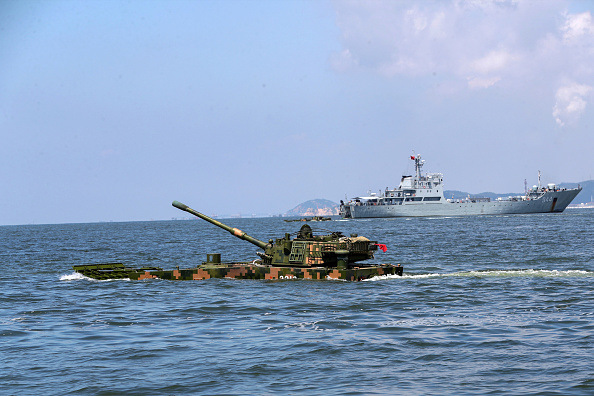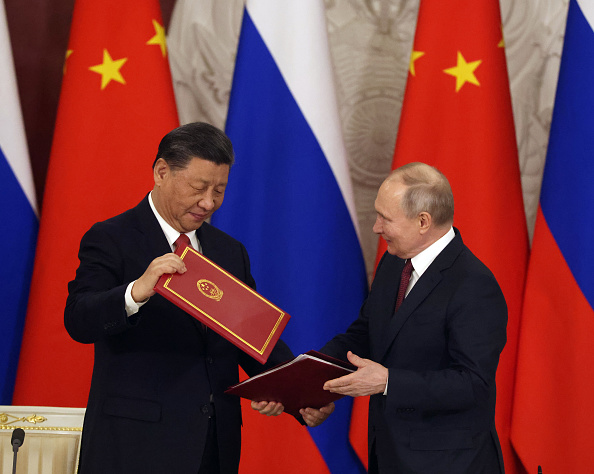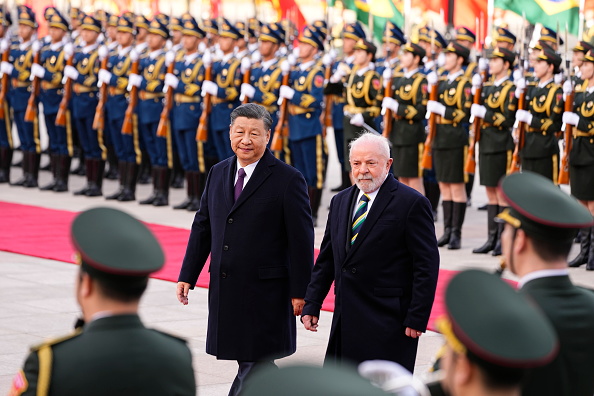
 Shoulder-to-Shoulder
Shoulder-to-ShoulderThis week, the People's Liberation Army held three days of military drills around Taiwan, simulating a precision strike and a blockade of the island. China sent warplanes flying toward Taiwan more than 200 times, while its navy ships performed "actual combat training" around the island.
Washington criticized China's display of firepower as disproportionate, and Tsai criticized China for its "irresponsible" behavior.
These actions took place after Taiwan President Tsai Ing-wen's recent meeting with U.S. House speaker Kevin McCarthy, who commented after the meeting that the U.S.-Taiwan "bond is stronger now than at any time or point in my lifetime." Following the meeting, the Foreign Affairs Committee of the National People's Congress released a statement, stating that it "gravely violated" the one-China principle and the provisions of the three China-U.S. joint communiques, and that China "firmly opposes and strongly condemns the move."
Meanwhile, the U.S. and the Philippines are holding their largest-ever joint military drills called Balikatan (Tagalog for "shoulder-to-shoulder"), noting that it is intended to show their commitment to peace and stability in the Indo-Pacific region.
The drills involve over 17,000 military personnel and live-fire maneuvers, including a ship-sinking rocket attack and beach assaults to simulate retaking an island near the disputed South China Sea.
"What you're witnessing here today is really operationalizing everything that our political leaders are talking about from integrated deterrence to campaigning to building an enduring advantage," U.S. Army Pacific commander Gen. Charles Flynn told journalists invited to witness the drills.
U.S. and Filipino military officials claim the exercises should not be viewed as a response to developments in Taiwan.
Read more in "Tough Choices for the Tsai Ing-Wen Administration," by Nathaniel Schochet, an Analyst at CJPA Global Advisors.
 Signals Intelligence
Signals IntelligenceDuring Xi Jinping's recent trip to Russia, he and Vladimir Putin made a number of important decisions about the future of Chinese-Russian defense cooperation and likely came to an agreement on arms deals, according to an alleged U.S. intercept of Russian intelligence revealed in leaked secret documents.
According to "signals intelligence," China earlier this year "approved the incremental provision" of weapons to Russia in its conflict with Ukraine, and planned to disguise military equipment as civilian items.
Another leaked document said Beijing would consider a "significant" Ukrainian strike with U.S. or NATO weapons on Russian territory as an escalation of the conflict that would merit sending arms to Russia.
However, China's Foreign Minister said that it won't sell weapons to either side in the conflict, responding to Western concerns over Beijing's support to Russia.
China continues to stress its neutrality in the Ukraine-Russia war, pointing to its calls for respecting territorial sovereignty, however it continues to back Russia economically even while Western nations have sought to isolate and punish Moscow for its actions.
The leaked documents also reveal U.S. anxieties over growing Chinese and Russian influence in Latin America and Africa. One U.S. military document describes a sweeping propaganda plan by Russian intelligence to shape public opinion in Africa.
Read more in "A Long Way to Go," by Phil Cunningham, an Independent Scholar.
 Lula In China
Lula In ChinaChinese President Xi Jinping welcomed Brazilian President Luiz Inácio Lula da Silva in Beijing on Friday, as part of a four-day state visit aimed at strengthening ties between two of the world's largest developing nations.
The two governments signed 15 agreements on various sectors, such as renewable energy, agribusiness, information technology, health, and infrastructure. While the meeting focused largely on trade ties and economic cooperation, they also touched on the conflict in Ukraine, with both countries agreeing on the need for a negotiated settlement.
Lula's visit also included a stop in Shanghai at the New Development Bank, where former Brazilian President Dilma Rousseff was inaugurated as the bank's new president.
Experts have noted that the trip highlights Brazil's desire to reverse ex-president Bolsonaro's antagonistic policies towards China and promote cooperation in various areas.
Brazil's Finance Ministry said the country is planning a "leap forward" in the quality of [its] relationship" with China and reiterated that this does not affect Brazil's interest in having strong bilateral ties with the U.S.
Meanwhile, Xi stated that "as comprehensive strategic partners, China and Brazil share extensive common interests,"and that "China...sees the relationship as a high priority on its diplomatic agenda."
The visit comes after the two countries reached a yuan-settlement deal in February, aimed at improving cross-border trade, and as Beijing looks to expand its political and economic influence in Latin America, amid rising tensions with the United States.
Prepared by China-US Focus editorial teams in Hong Kong and New York, this weekly newsletter offers you snap shots of latest trends and developments emerging from China every week, while adding a dose of historical perspective.
- 2023-04-07 Push and Pull
- 2023-03-31 Tsai in Transit
- 2023-03-24 A Changing World
- 2023-03-17 Peacemaker Xi
- 2023-03-10 Party Time
- 2023-03-03 “An Existential Struggle”
- 2023-02-24 Opposing Worldviews
- 2023-02-17 Ripple Effects
- 2023-02-10 Ballooning Tensions
- 2023-02-03 Hot Air
- 2023-01-27 Spheres of Influence
- 2023-01-20 China's Davos Pitch
- 2023-01-13 Strategic Encounters
- 2023-01-06 Common Challenges
- 2022-12-23
- 2022-12-16 All in On Africa
- 2022-12-09 Seeking Stabilization
- 2022-12-02 Turf Tension
- 2022-11-18 Thawing Ties?